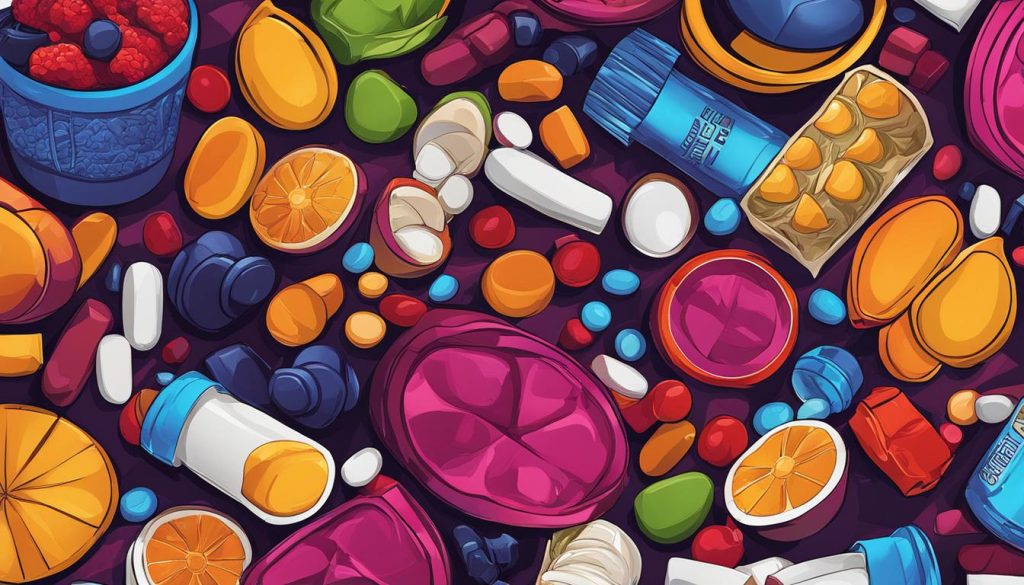Ad Blocker Detected
Our website is made possible by displaying online advertisements to our visitors. Please consider supporting us by disabling your ad blocker.
When it comes to maintaining optimal testosterone levels, many people turn to natural remedies and supplements. While the effectiveness of testosterone boosters is still a subject of debate, there are certain vitamins and nutrients that may play a role in supporting healthy testosterone production. In this article, we will explore some of the top vitamins for boosting testosterone levels and their potential benefits.
Key Takeaways:
- Vitamin D is crucial for testosterone production and can be obtained through sun exposure and certain foods.
- Vitamin B9, also known as folic acid, has been linked to improved sexual function and increased testosterone levels.
- Vitamin B3, or niacin, may help improve blood flow and circulation, potentially benefiting erectile function.
- Ginseng, a popular herbal supplement, has been associated with increased testosterone levels and improved sexual function.
- Fish oil, rich in omega-3 fatty acids, may have positive effects on testosterone levels and overall hormone health.
Best Vitamins for Boosting Testosterone: Vitamin D
Vitamin D is a crucial nutrient when it comes to testosterone production. Research has shown that increasing vitamin D levels can lead to higher testosterone levels as well. To optimize your vitamin D intake, it is recommended to aim for a daily dose of 400-800 IU. There are various ways to obtain vitamin D, including sun exposure and consuming foods that are high in this essential vitamin.
One way to increase your vitamin D levels is by getting regular sun exposure. When your skin is exposed to sunlight, it produces vitamin D naturally. However, it’s important to be cautious about excessive sun exposure and protect your skin from harmful ultraviolet (UV) rays. Alternatively, you can incorporate vitamin D-rich foods into your diet, such as fatty fish like salmon and mackerel, as well as fortified dairy products like milk and yogurt.
Vitamin D plays a critical role in testosterone production and maintaining optimal levels is important for overall hormonal balance and men’s health.
Adding a vitamin D supplement to your daily routine can also be an effective way to boost your vitamin D levels. There are various vitamin D supplements available on the market, ranging from tablets to capsules and liquid forms. Before starting any new supplement regimen, it’s always a good idea to consult with a healthcare professional to determine the appropriate dosage for your specific needs.
| Vitamin D-Rich Foods | Vitamin D Content (per 100g) |
|---|---|
| Fatty Fish (Salmon) | 526 IU |
| Mackerel | 200-360 IU |
| Fortified Milk | 98 IU |
| Fortified Yogurt | 154-198 IU |
Incorporating vitamin D into your daily routine through sun exposure, diet, and supplements can help optimize testosterone levels and support overall men’s health.
Best Vitamins for Boosting Testosterone: Vitamin B9
Vitamin B9, also known as folic acid, is a key nutrient that has been linked to improved sexual function and increased testosterone levels. Research suggests that supplementing with vitamin B9 may help improve erectile function and increase sperm count and quality.
One study published in the Journal of Urology found that men with erectile dysfunction and low testosterone levels who took a combination of folic acid and zinc experienced significant improvements in erectile function and testosterone levels.
“Our findings suggest that folic acid supplementation may be an effective strategy for men with erectile dysfunction and low testosterone levels.”
Vitamin B9 plays a crucial role in the synthesis of DNA and cell division, which are essential processes for sperm production. By ensuring an adequate intake of folic acid, you can support healthy sperm production and potentially increase fertility.
Good food sources of vitamin B9 include:
- Green leafy vegetables such as spinach, kale, and broccoli
- Legumes such as lentils, chickpeas, and black beans
- Avocados
- Citrus fruits such as oranges and strawberries
Supplementing with vitamin B9 can be a convenient way to ensure you’re getting enough of this important nutrient. However, it’s always best to consult with a healthcare professional before starting any new supplement regimen.

| Vitamin B9 Sources | Vitamin B9 Content per 100g |
|---|---|
| Spinach | 194 mcg |
| Kale | 141 mcg |
| Broccoli | 108 mcg |
| Lentils | 181 mcg |
| Chickpeas | 172 mcg |
| Black beans | 172 mcg |
| Avocado | 81 mcg |
| Oranges | 30 mcg |
| Strawberries | 24 mcg |
Best Vitamins for Boosting Testosterone: Vitamin B3
Vitamin B3, also known as niacin, plays an essential role in the overall health and function of the body. When it comes to testosterone levels, niacin has been shown to have some promising effects.
One of the key benefits of niacin is its ability to improve blood flow and circulation throughout the body. This can have a positive impact on erectile function and overall sexual health. Additionally, research suggests that niacin supplementation may increase testosterone levels, particularly in men with high blood pressure or hardening of the arteries.
When it comes to incorporating niacin into your diet, there are several food sources that are rich in vitamin B3. These include:
- Liver
- Chicken breast
- Tuna
- Avocados

Supporting Research:
In a study published in the Journal of Sexual Medicine, researchers found that niacin supplementation improved erectile function in men with moderate to severe erectile dysfunction.
Another study published in the International Journal of Endocrinology showed that niacin supplementation increased testosterone levels in men with metabolic syndrome, a condition often associated with low testosterone levels.
Best Vitamins for Boosting Testosterone: Ginseng
In the quest for natural ways to boost testosterone levels, ginseng has emerged as a popular option. With a rich history in traditional medicine, ginseng has long been hailed for its potential to enhance vitality and improve overall well-being.
Some studies suggest that ginseng may also have a positive impact on testosterone levels and sexual function. While research in this area is still ongoing, preliminary findings indicate that ginseng may help stimulate testosterone production and support healthy hormone balance.
Ginseng is available in various forms, including supplements and herbal teas. If you’re considering incorporating ginseng into your routine, it’s important to consult with a healthcare professional to ensure it’s safe for you and to determine the appropriate dosage.
| Vitamin | How It Boosts Testosterone |
|---|---|
| Ginseng | May stimulate testosterone production and promote hormonal balance. |
While ginseng shows promise as a natural testosterone-enhancing vitamin, it’s crucial to note that more research is needed to fully understand its effectiveness and potential side effects. As with any supplement, it’s essential to consult with a healthcare professional before adding ginseng or any new supplement to your routine.
Ginseng: A Powerful Herb for Vitality
Ginseng, a herb with a storied history in traditional medicine, is renowned for its potential to improve vitality and overall health. Emerging research suggests that ginseng may offer additional benefits in terms of boosting testosterone levels and improving sexual function.
“Ginseng supplementation may help stimulate testosterone production and support healthy hormone balance.”
While evidence is still evolving, ginseng supplements can be a convenient way to incorporate this powerful herb into your routine. To ensure optimal results and safety, it’s crucial to consult with a healthcare professional before starting any new supplement regimen.
Best Vitamins for Boosting Testosterone: Fish Oil
Fish oil, rich in omega-3 fatty acids, offers a multitude of health benefits, including potential effects on testosterone levels. Research suggests that fish oil supplementation may help increase testosterone levels and improve overall hormone health.
The omega-3 fatty acids found in fish oil may support the production of testosterone, a key hormone in male reproductive health. By incorporating fish oil into your diet or taking a high-quality fish oil supplement, you can potentially enhance your testosterone levels and promote optimal hormone balance.
When considering fish oil supplementation, it is important to choose a reputable brand that undergoes third-party testing to ensure purity and potency. Consulting with a healthcare professional is always advisable before starting any new supplement regimen to ensure it is suitable for your specific needs.
FAQ
Are there any vitamins that can boost testosterone levels?
While the research on testosterone boosters is inconclusive, there are some vitamins that may be beneficial. Natural substances such as fenugreek seed extracts and ashwagandha root have shown promise for increasing testosterone levels in some men. However, lifestyle and dietary changes may be more helpful for overall testosterone enhancement. It’s important to note that more research is needed to evaluate the safety and effectiveness of testosterone booster supplements for the general population.
Can vitamin D increase testosterone levels?
Yes, vitamin D has been shown to play a crucial role in testosterone production. Increasing vitamin D levels may lead to increased testosterone levels. The recommended daily dose for vitamin D is 400-800 IU. Getting adequate sun exposure and consuming foods high in vitamin D, such as fatty fish and fortified dairy products, can also help boost vitamin D levels.
Can vitamin B9 improve testosterone levels and sexual function?
Research suggests that vitamin B9, also known as folic acid, can improve sexual function and increase testosterone levels. Supplementing with vitamin B9 may help improve erectile function and increase sperm count and quality. Good food sources of vitamin B9 include green leafy vegetables, legumes, avocados, and citrus fruits.
Can vitamin B3 increase testosterone levels?
Vitamin B3, also known as niacin, has been shown to improve blood flow and circulation, which can benefit erectile function. Some studies suggest that niacin supplementation may increase testosterone levels, particularly in men with high blood pressure or hardening of the arteries. Foods rich in vitamin B3 include liver, chicken breast, tuna, and avocados.
Can ginseng help boost testosterone levels?
Ginseng has long been used in traditional medicine to improve vitality. Some studies suggest that ginseng may help increase testosterone levels and improve sexual function. However, more research is needed to fully understand its effectiveness. It is important to consult with a healthcare professional before starting any new supplement regimen.
Can fish oil improve testosterone levels?
Fish oil, which is high in omega-3 fatty acids, has been shown to have numerous health benefits, including potential effects on testosterone levels. Some studies suggest that fish oil supplementation may help increase testosterone levels and improve overall hormone health. It is important to choose a high-quality fish oil supplement and consult with a healthcare professional before starting any new supplement regimen.
Do These Vitamins for Boosting Testosterone Levels Really Work?
Looking to increase your testosterone levels? Many are turning to top testosterone enhancer vitamins. While some research suggests that certain vitamins like Vitamin D and Zinc may help promote healthy testosterone levels, it’s important to consult with a healthcare professional before starting any new supplement regimen to maximize effectiveness and safety.
How Can Vitamins Help Boost Testosterone Levels in Comparison to TRT Supplements?
Many people are turning to premier TRT supplement optimization to boost testosterone levels. However, vitamins can also play a crucial role in improving testosterone production. Vitamins like D, C, and E are known to support healthy testosterone levels and hormone regulation, offering a natural alternative to TRT supplements.


